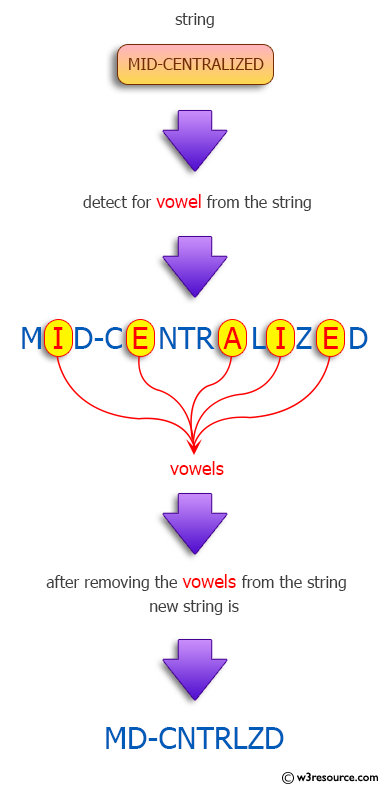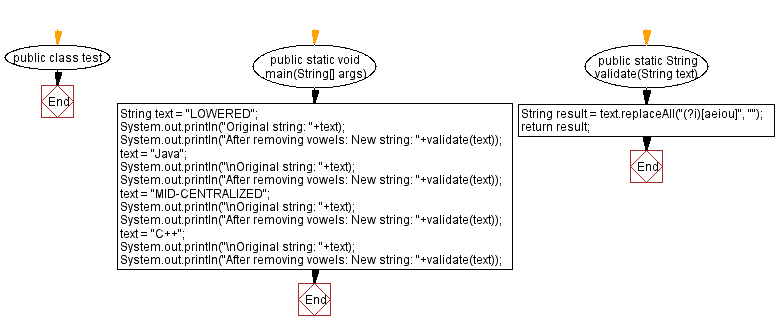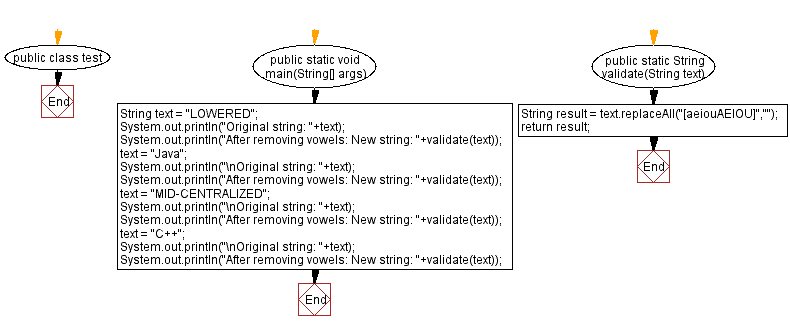Java programming Exercises: Remove all the vowels of a given string and return the new string
Java Regular Expression: Exercise-15 with Solution
Write a Java program to remove all the vowels of a given string. Return the new string.
Here we consider a, e, i, o, u are vowels (not y).
Sample Solution-1:
Java Code:
public class test {
public static void main(String[] args) {
String text ="LOWERED";
System.out.println("Original string: "+text);
System.out.println("After removing vowels: New string: "+validate(text));
text ="Java";
System.out.println("\nOriginal string: "+text);
System.out.println("After removing vowels: New string: "+validate(text));
text ="MID-CENTRALIZED";
System.out.println("\nOriginal string: "+text);
System.out.println("After removing vowels: New string: "+validate(text));
text ="C++";
System.out.println("\nOriginal string: "+text);
System.out.println("After removing vowels: New string: "+validate(text));
}
public static String validate(String text) {
String result = text.replaceAll("(?i)[aeiou]", "");
return result;
}
}
Sample Output:
Original string: LOWERED After removing vowels: New string: LWRD Original string: Java After removing vowels: New string: Jv Original string: MID-CENTRALIZED After removing vowels: New string: MD-CNTRLZD Original string: C++ After removing vowels: New string: C++
Pictorial Presentation:

Flowchart :

Sample Solution-2:
Java Code:
public class test {
public static void main(String[] args) {
String text ="LOWERED";
System.out.println("Original string: "+text);
System.out.println("After removing vowels: New string: "+validate(text));
text ="Java";
System.out.println("\nOriginal string: "+text);
System.out.println("After removing vowels: New string: "+validate(text));
text ="MID-CENTRALIZED";
System.out.println("\nOriginal string: "+text);
System.out.println("After removing vowels: New string: "+validate(text));
text ="C++";
System.out.println("\nOriginal string: "+text);
System.out.println("After removing vowels: New string: "+validate(text));
}
public static String validate(String text) {
String result = text.replaceAll("[aeiouAEIOU]","");
return result;
}
}
Sample Output:
Original string: LOWERED After removing vowels: New string: LWRD Original string: Java After removing vowels: New string: Jv Original string: MID-CENTRALIZED After removing vowels: New string: MD-CNTRLZD Original string: C++ After removing vowels: New string: C++
Flowchart :

Java Code Editor:
Contribute your code and comments through Disqus.
Previous: Count number of vowels in a given string using regular expression.
Next: Replace all the vowels in a given string with a specified character.What is the difficulty level of this exercise?
Test your Programming skills with w3resource's quiz.
Java: Tips of the Day
What is the best way to filter a Java Collection?
Java 8 (2014) solves this problem using streams and lambdas in one line of code:
List<Person> beerDrinkers = persons.stream()
.filter(p -> p.getAge() > 16).collect(Collectors.toList());
Use Collection#removeIf to modify the collection in place. (Notice: In this case, the predicate will remove objects who satisfy the predicate):
persons.removeIf(p -> p.getAge() <= 16);
lambdaj allows filtering collections without writing loops or inner classes:
ListbeerDrinkers = select(persons, having(on(Person.class).getAge(), greaterThan(16)));
Ref: https://bit.ly/3uwYid6
- New Content published on w3resource:
- HTML-CSS Practical: Exercises, Practice, Solution
- Java Regular Expression: Exercises, Practice, Solution
- Scala Programming Exercises, Practice, Solution
- Python Itertools exercises
- Python Numpy exercises
- Python GeoPy Package exercises
- Python Pandas exercises
- Python nltk exercises
- Python BeautifulSoup exercises
- Form Template
- Composer - PHP Package Manager
- PHPUnit - PHP Testing
- Laravel - PHP Framework
- Angular - JavaScript Framework
- Vue - JavaScript Framework
- Jest - JavaScript Testing Framework
